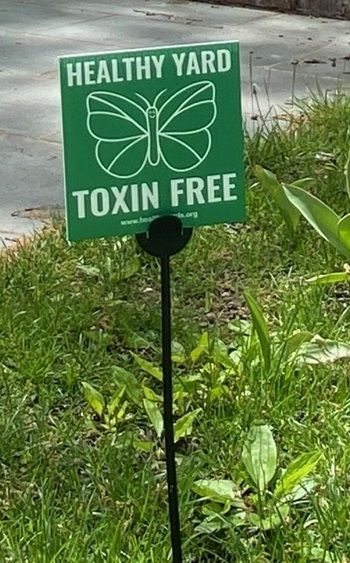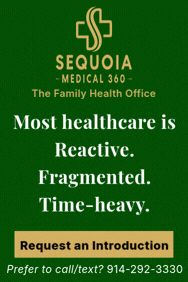For Earth Month: Healthy Landscaping Research, Tips, and FREE Yard Sign!

By the Bronxville Green Committee
April 10, 2024: Can’t wait for spring? Neither can we! April’s buds and birdsong offer another opportunity to adopt the best landscaping practices, based on recent research, for keeping our environment healthy for our families, pets, and other living creatures.
Spring into a healthy yard with some or all of these actions and if you’ve already committed to a yard free of chemicals, we will send you a “Heathy Yard Toxic Free” sign to post on your lawn and help create awareness. Contact us at This email address is being protected from spambots. You need JavaScript enabled to view it..
STEP 1: Eliminate Pesticides
The bad news…
Recent research has made clear that chemical fertilizers, pesticides, herbicides, fungicides, and insecticides are strongly correlated with increased risks for many common diseases, including heart disease, stroke, cancer, and diabetes. These risks persist over generations, and children are especially vulnerable. The chemicals pollute our environment, kill pollinators and other wildlife, and endanger our safety. Pesticides tracked into our homes on shoes and clothing can persist for long periods. And as you may have suspected, the little yellow flags left on lawns after chemical treatments, which say it’s safe to walk on the lawn within 24 to 48 hours—not necessarily true! Studies have shown that depending on many factors, toxic chemicals may stick around for a long time. RoundUp, also known as glyphosate (which Massachusetts has banned), can stay in soil for up to a year! Even most grass seed is sold impregnated with potentially toxic fungicide.
The good news…
We can have beautiful landscapes without these chemicals!
-You can ask your landscaper for only targeted, organic treatments for specific problems.
-Many homeowners have learned to love a more natural looking lawn.
-In general, a multi-species lawn is a healthier one.
-It might be hard to find, but you can request untreated grass seed; a layer of straw on top can keep seed moist and in place until the seed germinates.
-Removing your shoes when you come inside, washing clothing that contacted the grass, and frequently mopping floors drastically reduces pesticides in the home.
-Last year, New York State passed the Birds & Bees Protection Act, which limits the use of a notorious group of pesticides called neonicotinoids (neonics for short). It’s a good start; you might consider supporting proposed science-based legislation that further restricts pesticide use.
STEP 2: Don’t Panic About Ticks and Mosquitos
The bad news…
As climate change increases the dangers of disease-borne illnesses from insects such as ticks and mosquitos, our first instinct might be to call a service for a chemical treatment. Studies have shown that such treatments do environmental harm, often without solving the problem, and the insects can develop immunity over time.
The good news…
A better solution is called Integrated Pest Management, in which we work with nature to keep pests under control and eliminate places where non-beneficial insects can breed and live. Learn more HERE and HERE.
STEP #3: Resist The Urge To Spring Clean Your Yard Too Early
The bad news…
When landscaping crews use leaf blowers early in the spring to clean up all your yard debris (usually on March 15th, the day Bronxville’s gas-powered leaf blower ban is lifted), they’re destroying any beneficial insects, and the eggs they laid, that might have overwintered in the stalks and leaves. That’s bad news for pollinators. Your family’s health also takes a hit from the molds and fungus kicked up by the blowers.
The good news…
We can resist the urge to remove all the dried-out stalks and detritus from last year’s garden. It’s better to give time for the insects to wake up after winter and for their eggs to hatch. Ask your landscaper to wait several more weeks before cleaning up. If you can’t wait, gently cut the stalks and lay them in a pile on one side of your yard, allowing the insects time to emerge.
STEP 4: Don’t Mow Now…Keep The Grass Longer
The bad news…
Many Bronxville landscapers have already begun mowing grass that in many cases was already very short. That destroys any spring flowers in the grass, depriving early insects of nectar, and weakens the roots, leaving the lawn prone to disease and vulnerable to drought.
The good news…
It’s not too late to ask your landscaper to change the mowing schedule. Keeping the grass longer—at least three inches--will result in a healthier lawn, one more resistant to drought and disease, while also requiring less watering. Even better, stop mowing altogether until June. Flowers in your lawn such as clover, native violets and dandelions offer nectar to early pollinators, providing an essential ecoservice. The flowers look pretty, and your yard will begin to come alive with flying creatures.
Other important steps:
-Add native plants to your landscape
-Remove invasive plants and ivy on trees
-Shrink your lawn
-Turn off lights
Learn more at on our website!
The Bronxville Green Committee is a volunteer organization that is part of the Village of Bronxville. We work to propose and implement environmentally sustainable programs in our community.
Sustainable Living Directory
The Bronxville Green Committee is a volunteer organization under Village government. We work with the Trustees and Village staff on programs that promote clean energy initiatives and sustainable ways of living. Our programs include The Bronxville Giving Garden, a community garden whose produce is donated to local groups; Take Back Day, when we collect items to be recycled; and Pollinator Pathways, which encourages adding native plants to our gardens. We believe everyone can make a difference by adopting simple, sustainable practices in daily life so we can work together to protect what we love -- our families, our homes and our town.















